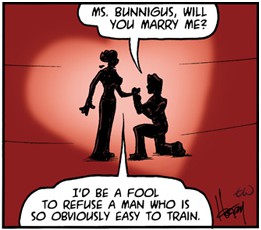
I’m mashing up two tropes this week because I’m not satisfied with the one. There are a bazillion tropes about characters who are sexually active, but very few about sexually chaste characters that don’t portray them as weak, clueless, or socially inept.
According to tvtropes, a celibate hero is a main character who “doesn’t do the romance thing.” Unlike the chaste hero, who is just clueless, the celibate hero has made a conscious decision not to engage in sexual relations or get tied down in a relationship. There may be any number of reasons for this, but it usually comes down to some combination of Love is a Weakness, Love Hurts, and It’s Not You, It’s My Enemies.
(As a hilarious example of this: TESLA!!!)
But what about the character who isn’t necessarily opposed to romance, but feels that they should wait until marriage to have sex? Unfortunately, this trope is pretty rare nowadays. I can only think of two mainstream examples: Edward from Twilight and Reverend Theo from Schlock Mercenary.
Theo in particular is a great example of this, because he’s not clueless, he’s not weak, and he not only gets the girl, he gets the girl that everyone wants. The only reason he holds out is because his religious order forbids sex before marriage. It does permit priests to marry, however, so Theo does manage to balance the two.
So why are characters like this so rare? Unfortunately, I think it comes down to the widespread notion that a true man isn’t a virgin, and that sex makes people cool. If we accept these tropes as true, then that means that men who exercise self-restraint are actually weak and pitiful, and couples who choose to wait are pathetic losers.
It’s worth pointing out that both Edward and Reverent Theo were created by writers who are practicing Mormons–people who belong to a religious community where it’s still the norm to wait until marriage. If literature is the way that the culture speaks to itself, then this goes to show just how unrestrained the rest of Western society has become.
This is why I think that the better trope for this kind of character is The Fettered. Unlike the celibate hero, who usually gives up sex for some kind of external reason, the fettered gives it up as a matter of principle. Living by his ideals isn’t easy, and he’s constantly tempted to give in and break his moral code. However, by resisting these temptations, the fettered gains great strength, and can stand like a beacon of light in an otherwise disillusioned world.
This is actually something that I tried to do with my latest novel, Desert Stars. The main character, Jalil, is a man who believes in honor, and follows a code of abstinence before marriage. However, to manipulate him into staying at the camp, his father charges Mira, the female protagonist, to seduce him. Since the fettered’s strength is also his greatest weakness, if Mira can get Jalil to sully her honor, then out of shame he will return and marry her.
The catch? She actually has feelings for him, and doesn’t want to manipulate him in this way. In this way, merely persuading him to have sex isn’t a win condition–in fact, if done in the wrong way, it could be a very serious “game over.”
Whether or not I actually pulled it off well is up to the readers to judge. But one thing I was definitely shooting for was to write a character who fulfills this trope in an unconventional yet powerful way. And if you’ll permit me to step onto my soapbox for a little bit, I think our culture desperately needs more heroes like this–heroes who show that real men are capable of self-restraint, and that following a moral code is still cool, even if it means waiting to consummate a relationship.
And the point of consummating a relationship after making publicly witnessed commitments is to value the relationship over the individual. As you know, we live in a god-less pop culture, where the highest power is the individual.
Good point.
Every good western Has the guy leaving without the girl.
Interesting.